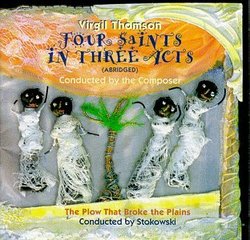| All Artists: Virgil Thomson, Edward Matthews, Randolph Robinson, Abner Dorsey, Altonell Hines, Beatrice Robinson-Wayne, Inez Matthews Title: Virgil Thomson: Four Saints In Three Acts/ text by Gertrude Stein Members Wishing: 0 Total Copies: 0 Label: RCA Release Date: 1/16/1996 Genres: Soundtracks, Classical Styles: Opera & Classical Vocal, Historical Periods, Modern, 20th, & 21st Century, Symphonies Number of Discs: 1 SwapaCD Credits: 1 UPC: 090266816323 |
Search - Virgil Thomson, Edward Matthews, Randolph Robinson :: Virgil Thomson: Four Saints In Three Acts/ text by Gertrude Stein
 | Virgil Thomson, Edward Matthews, Randolph Robinson Virgil Thomson: Four Saints In Three Acts/ text by Gertrude Stein Genres: Soundtracks, Classical
|
Larger Image |
CD Details |
CD ReviewsA wonderful opera, superbly performed 11/13/1998 (5 out of 5 stars) "Four saints in Three Acts is one of the best American operas. It was written in the late 20s and first performed in 1934 with an all black cast, cellophane scenery and ran for 60 perormances -- quite a few for an American opera. The music -- simple and direct but subtle -- is endlessly inventive and beautiful. This recording was made in 1947. it is an abridgement for recording, and works well. I like this performance more than the Thom performance on Nonesuch.The Plow that Broke The Plains is Thomson's best known work, and a very pleasant make-weight." Brilliance revisited David Spanswick | Brighton United Kingdom | 02/05/2000 (5 out of 5 stars) "What a joy it was to revisit this astonishing recording of the original 1947 performance of this revolutionary piece of music. My old vinyl mono recording introduced me to the talents of both Gertrude Stein and Virgil Thomson. If you do not have this copy in your collection then you are missing a nostalgic experience of universal relevence and uninhibited fun. Have a "Four Saints" party and celebrate!" Music and words dancing Thomas Dilworth | Windsor, Ontario | 07/17/2006 (5 out of 5 stars) "The music is lively, constantantly gratuitously inventing itself to keep up with the libretto, which initially (because written first) gratuitously invents itself. The music sometimes inflates with grandiose feeling, but that seems ok. The text is mostly nonsense but sometimes isnt. Thomson once told me, this is "a Catholic opera by a Jew (Stein) and a Baptist (himself). It is often ecumenically, or better, nondenominationally religious--sanctity here consisting of gratuitously hanging out with other saints (meaning anyone) and spontaneously enjoying it. Sanctity is present awareness. Saints are analogous here with artists (as Thomson also said) and lovers. All three belong to culture, which is gratuitous (as distinct from utile civilization). Often the music reads the words, expressing implicit meaning. At other times, the words and music are autonamous, like two distinct individuals dancing, and they dance beautifully, even when they dance different dances. Listening to the music alone (and to what words you can distinguish) is not enough--the effect of listening while reading the libretto is astonishing. Together the words-and-music are joyful, heavenly. The radio opera-quiz wiz Father Owen Lee once told me that he considers this the greatest American opera. Others say it is among the top five. And here we get to hear Virgil Thomson conduct it."
|

 Track Listings (27) - Disc #1
Track Listings (27) - Disc #1